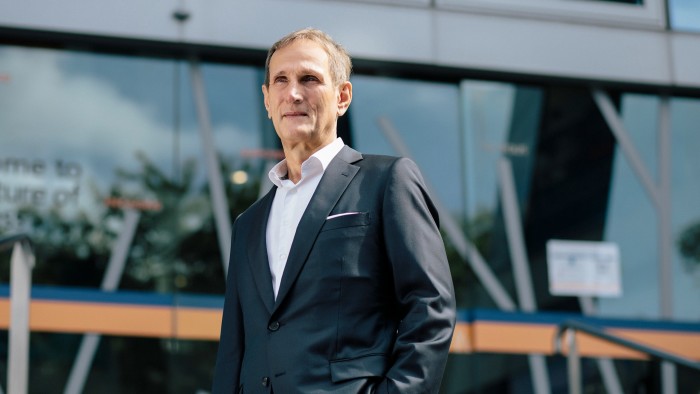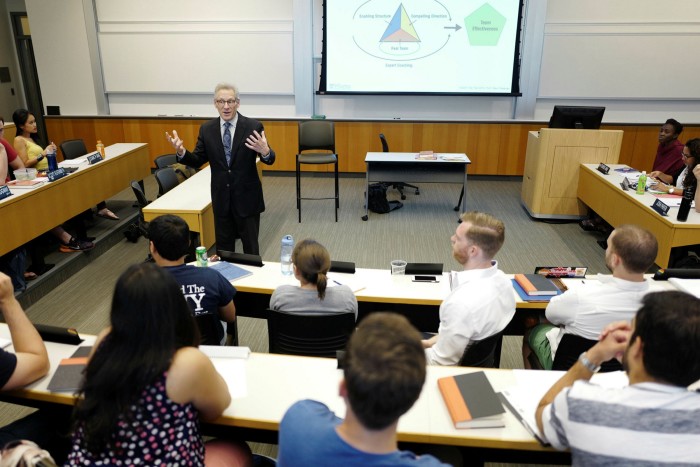MBA professors under pressure to show business relevance

Roula Khalaf, Editor of the FT, selects her favourite stories in this weekly newsletter.
Online learning came of age when the world went into lockdown in early 2020, with faculty forced to embrace technology to keep classes running remotely. The fallout from this may change for ever the traditional “sage on the stage” model of MBA instruction — and the roles of those who teach it.
Professors used to be the central figures of the MBA classroom, imparting knowledge by lecturing. But with much of the curriculum now available online, faculty are having to consider carefully how to add value.
Jochen Wirtz, professor of marketing at the National University of Singapore Business School, says faculty increasingly act more as guides helping students to learn, often by leading debates with guest speakers. “In the old days, you would just go to the front of the class and teach,” says Wirtz, a German who joined the school in 1992. “Now, we are having to rethink our approach.”
He believes the increased use of technology has benefited students, who can study the basics in their own time online, while contact time is devoted to interactive discussions, sometimes involving senior executives. Video conferencing also made it easier to attract these guest speakers. “Covid was a healthy shake-up for teaching,” says Wirtz.
FT Global MBA Ranking 2022 — the top 100

Find out which schools are in our ranking of MBA degrees. Learn how the table was compiled and read the rest of our coverage at www.ft.com/mba.
In the wake of the pandemic, academics face pressures on multiple fronts. There is rising competition from alternative instructors, and criticism that business school research lacks practical relevance. “It’s hugely tough for faculty right now,” says Caryn Beck-Dudley, president and chief executive of the Association to Advance Collegiate Schools of Business (AACSB), the accreditation body.
There is also some good news, particularly for the academic elite, with salaries increasing. According to the AACSB, between 2007-08 and 2020-21, average pay for the highest-ranked business school professors across all disciplines rose by 36 per cent from $127,200 to $173,300, outstripping US inflation.
Mauro Guillén, dean at Cambridge Judge Business School in the UK, says academic institutions compete fiercely to hire the next generation of rising-star professors from the top PhD programmes. “Every year there’s a small number of superstars, and everyone wants them,” Guillén says. “That drives salaries up.”
As the stars command ever higher salaries, this pushes up the average for overall pay, while schools that lose top faculty to rivals must pay more to replace them.
Business schools are also competing with the resources of the private sector — which typically pays more — to attract the top PhD graduates. The high opportunity cost of a job in academia is reflected in the number of business professors who also earn extra income from speaking engagements or consultancy work.
While there is, if anything, a glut of PhD graduates on the labour market, many cannot find academic jobs. Top business schools want to hire PhDs only from the best programmes, but this talent pool has not grown in line with the rising demand for business education in recent decades.
“Supply has not changed much, but demand has increased,” says Sankaran Venkataraman, senior associate dean for faculty and research at the University of Virginia Darden School of Business. “Schools are very careful about who they hire. Provenance is important.”
Many institutions say they cannot increase the size of their PhD programmes because of pressures on their operating budgets, leading some to solicit funds from donors to boost the supply of talent. Unlike MBA students, who pay tuition fees, PhD candidates receive funding from the institution. Venkataraman says the total cost could exceed $100,000 for each PhD candidate per year, and very often they will go on to work for a competitor. “For a school, it’s an odd proposition,” he says.
Some schools are hiring more industry executives to teach classes. They are often cheaper than tenured professors and bring real-world experience. This reflects the need to strike a balance between academic rigour and practical training. Many schools are coming under fire for focusing resources on theoretical research that reaches a narrow audience with limited practical application.
Ding Yuan, dean at China Europe International Business School in Shanghai, says the tenure system is partly to blame. Designed to safeguard academic freedom, tenure essentially gives professors a job for life. It is an “up or out” system, with academics required to achieve promotions within a certain timeframe. This puts pressure on them to “publish or perish”, Yuan believes, with an emphasis on quantity.
Some institutions have replaced tenure with fixed-term contracts, but measurement of research impact is in its infancy. Franz Heukamp, dean at Spain’s Iese Business School, calls for wider performance measures, such as grants, patents or references in policy documents. “We need to go beyond academia and serve society at large and solve real-world problems,” he says.
The best professors have the ability to convey these ideas in compelling ways, says Jacques Olivier, dean of faculty and research at HEC Paris. They have excellent presentation and communication skills, and can read and adapt to their audience. “People who write great papers but are unable to convey their ideas are unlikely to influence students, academics and the broader public,” he says.
Some deans suggest PhD programmes do not equip candidates with these skills and focus instead on research, forcing schools to train young scholars to teach on the job. There are limited ways for prospective MBA students to evaluate the quality of teaching and research, but deans draw an indirect link with their ability to charge high tuition fees.
“The thing that drives the reputation of the school is the quality of faculty,” says Andrew Rose, dean at National University of Singapore Business School.
He says institutions must invest in developing this. “The reason Harvard is Harvard is not because they teach better stuff but because the people who teach are really at the cutting edge.”
Comments